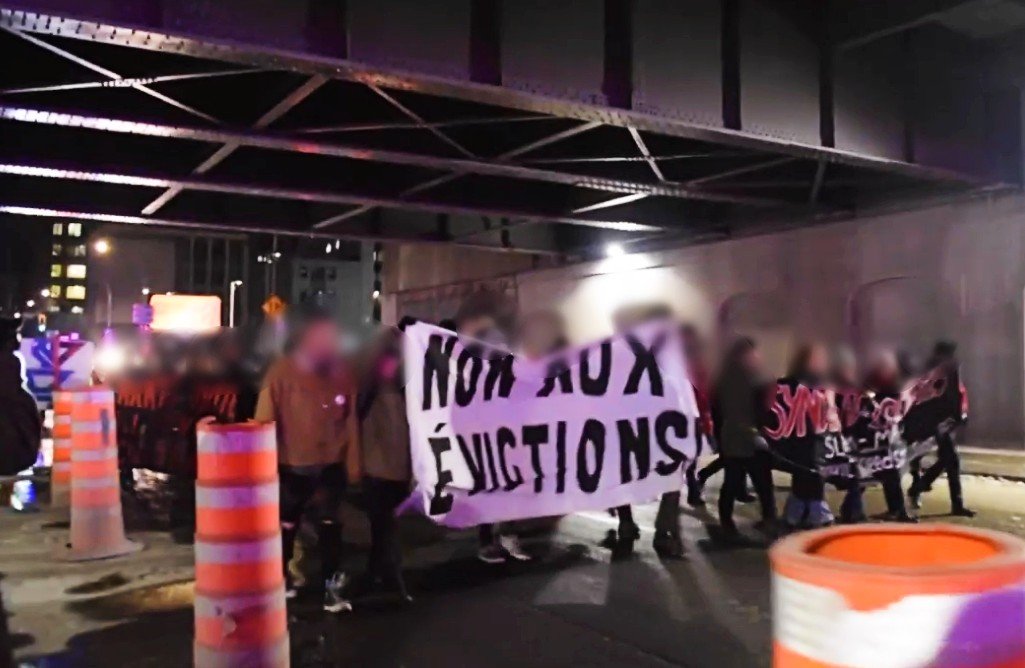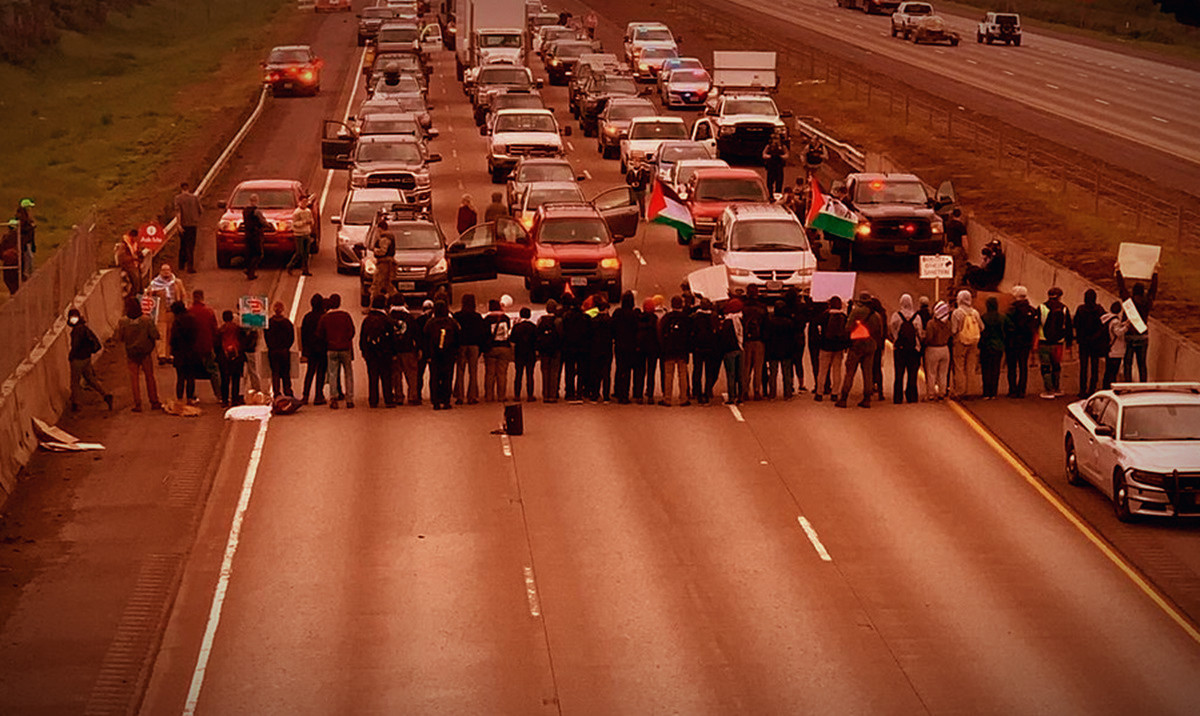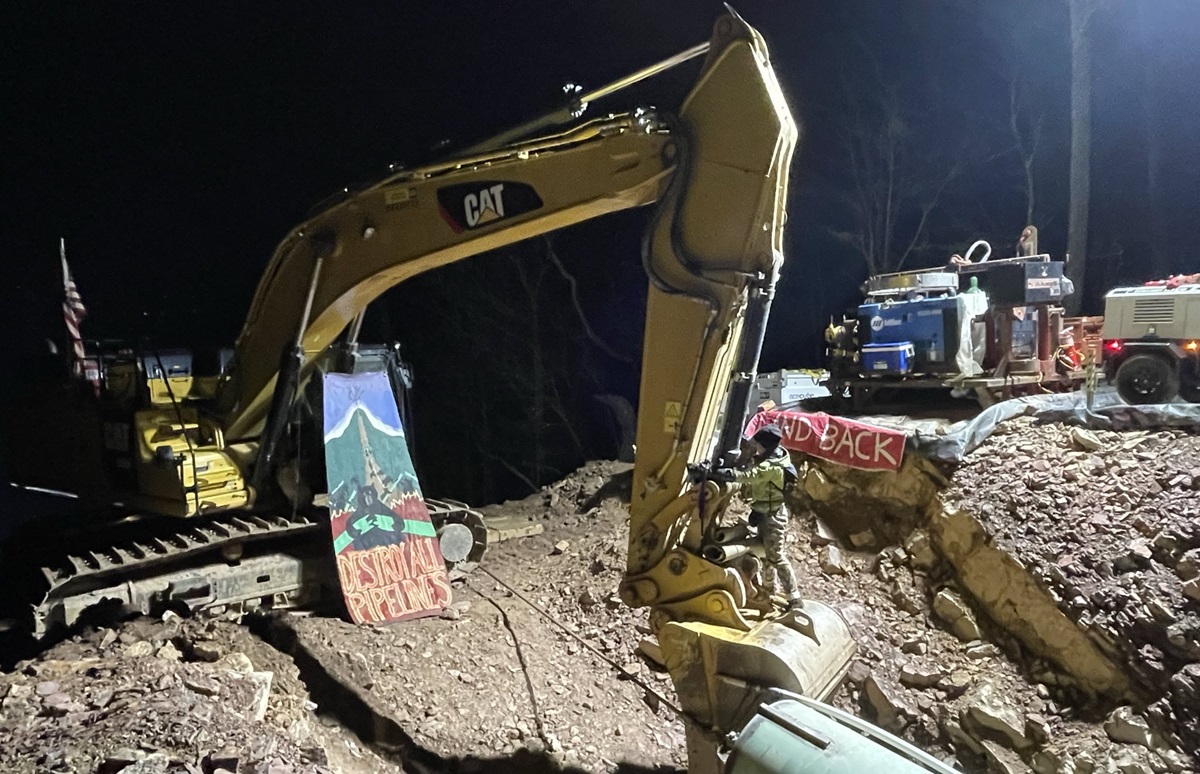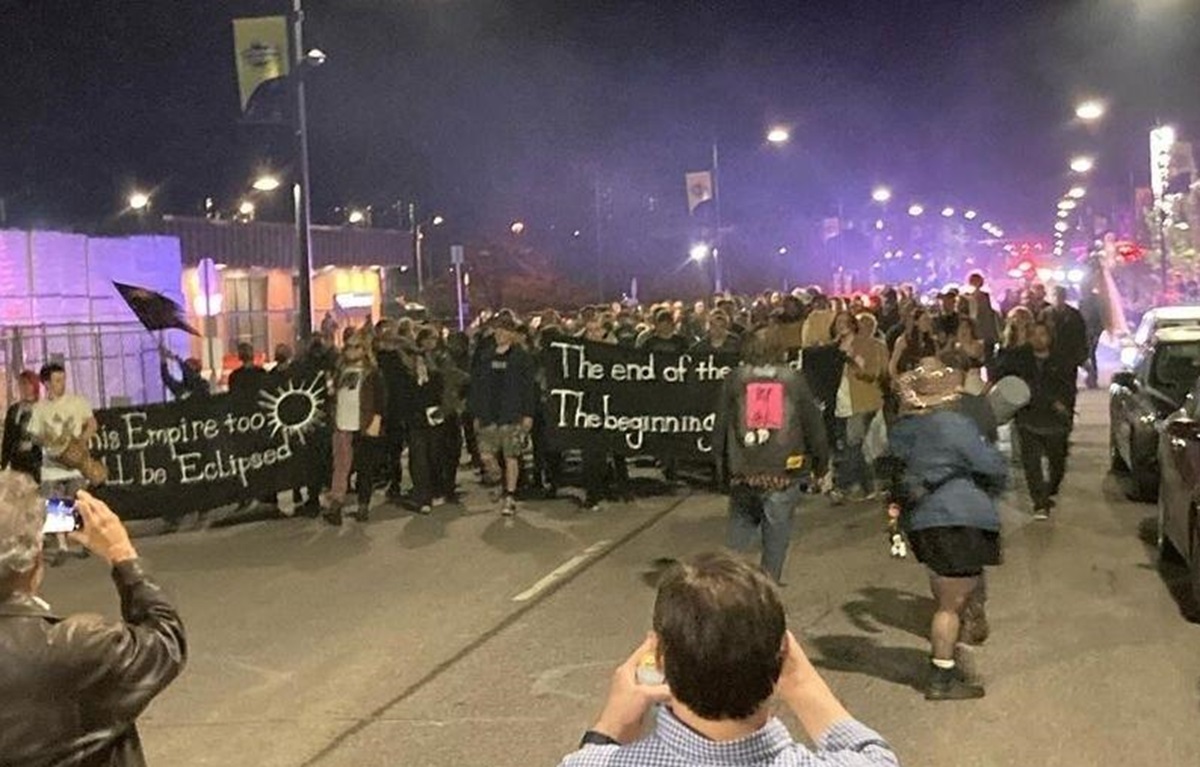Filed under: Canadian Tire Fire, Featured

This week we bring you a series of updates about Coastal Gaslink Pipeline, including recent acts of sabotage against the project and actions against RBC. We’ve also got repression updates about Trans Mountain Expansion project arrestees. Another migrant has died crossing the Canada-US border, raising attention again to the Safe Third Country Agreement that forces people to cross clandestinely and in more dangerous ways. Housing activists also continue to fight the promised eviction of an encampment under the Ville Marie Expressway in Montreal.
In antifascist news, tensions around drag story-times for kids have continued to escalate in Calgary. In the last month, three events have reportedly been cancelled due to threats from the far-Right. In late February, 5-6 individuals disrupted a story-time event at a local library. Derek Reimer, a protest organizer and homophobic street preacher, was forcibly removed by attendees. On March 6th he was arrested on harassment charges from the event and remains in custody after refusing to sign bail conditions that would prohibit him from attending future LQBTQ2S events.
"The Calgary man facing hate-crime charges after disrupting a storytime event at the Seton public library refuses to sign release conditions ordering him to stay away from LGBTQ2S+ community members and their events." https://t.co/AHodITaUyq
— Pastor Aunt E Phở 🟥⬛️ (@JaneQCitizen) March 6, 2023
A recent article by the CBC has identified that in Quebec, Inuit are incarcerated at a rate 15 times greater than the provincial average. In a 12-month period between 2021 and 2022, 4.5% of the Inuit population in Quebec was incarcerated. The transfer of Inuit to facilities far from their home has become the subject of a class-action lawsuit, which over 1,500 people have now joined. Multiple people interviewed for the story identified a dire lack of resources in Inuit communities, such as programs and services to help cope with trauma, as a root cause for the incarceration rates.
Updates on Fights Against Coastal Gaslink and Trans Mountain Pipelines
#AnarchistsInTheNews: “‘Trend of escalating violence’: Coastal GasLink decries pipeline sabotage claims on anarchist site” via @WLTribune https://t.co/yEKWO8j0UT
— Agency (@AnarchistAgency) February 28, 2023
Since our last issue, there have been developments in the fights against two BC pipeline projects – the Trans Mountain Expansion project and Coastal Gaslink. Both projects have been the subject of fierce opposition for years, from the Indigenous communities whose land they will go through, as well as environmentalists and anarchists.
On February 24th, a report emerged on BC Counter-Info, claiming several acts of sabotage along the Coastal Gaslink pipeline route.
The report back reads:
Over the past few months, several sections of the coastal gaslink pipeline have been vandalized. Financially, the consequences of each act were minor: a few holes in the pipeline here, some corroded welding seams there, damaged concrete here. Our goal was to contribute to the small delays in a project that was already well over budget.
We drilled holes less than a penny wide in a section of pipe that had not yet been lowered into the trench. We covered the holes with fiberglass film, which temporarily prevents leaks in the pipes, but only lasts a few months. We know that welded sections of coated pipe are assessed before being lowered into the trench. After the trench is backfilled, they are tested under pressure. The holes were sealed in the hope that they would pass the first pressure test, but will have to be excavated and repaired before the pipeline is completed. This occurred during the last week of October on section 8 of the pipeline, between Kilometers 610 and 613.
It then goes on to list 9 more actions having taken place between October and February. However, the report back ends by explaining that fake actions have also been inserted into the report to cause extra delays:
Or is that in fact what happened? Only some of these activities have actually taken place. We waited to share this information all at once, complete with some additional false reports, so the only way to know where repairs are really needed is to excavate and re-examine all the above-mentioned pipes. Cracked concrete or rusted and patched pipes can lead to small leaks and large-scale spills, which is why every action, whether genuine or falsified, is being brought to the attention of the public long before the pipeline is operational.
While we would prefer to write only completely honest report backs, we also believe that we should be resourceful and use every means at our disposal to delay construction as best we can. We apologize to those involved in the struggle for not being able to give you an accurate picture of what we have really accomplished. CGL we wish you all the best in your treasure hunt.
This report back follows not too long after a report by investigative journalists with The Narwhal which found that Fisheries and Oceans Canada (the DFO) has been using the burning of CIRG RCMP cars in Smithers and the February 2022 attack on a CGL worksite as excuses to intentionally scale back inspections of CGL river crossings. The freedom of information requests that revealed this information also showed that the intentional non-inspection of CGL coincided with an internal DFO concern about the abnormal number of fish deaths occurring during CGL pipeline construction. The concept that government agencies such as the DFO are not allies to environmentalists and Indigenous people is obviously not novel, but this report makes obvious that the DFO cannot be relied upon to enforce CGL compliance with even the most minimal of environmental regulations.
Also in Coastal Gaslink news, Wet’suwet’en land defenders recently applied to the BC Supreme Court to have their criminal contempt charges stayed. The charges stem from the raids of Coyote Camp in November 2021 that saw dozens of people arrested.
The submitted application focuses on the treatment of detainees by police. It notes:
“The Wet’suwet’en have asserted a right to live on and protect their territories for thousands of years, primarily through the feast hall governance system carried out communally by its clans and house groups,” the application states. “The impacts of the manner of enforcement are not limited to the individuals arrested, but extend to the efforts at reconciliation between the Wet’suwet’en and the federal and provincial governments.”
Meanwhile, activists continue to draw attention to RBC’s funding of CGL, with multiple banner drops and other public events happening recently. Climate justice activists at University of Toronto got a campus branch temporarily shut down for their funding of the pipeline.
Similar demonstrations demanding schools cut ties with the bank also took place elsewhere, including at Lakehead University in Thunder Bay.
Several land defenders arrested for protesting the Trans Mountain Expansion project were sentenced to around a month in jail recently. Four women involved with Secwépemc Unity Camp to Stop the Trans Mountain Pipleline were arrested in October 2020 when they gathered at the gate of a TMX construction site in Brocklehurst, BC, preventing a shift change.
Separately, several other TMX opponents were sentenced to around a month in jail for their charges of criminal contempt related to another protest during the same month in 2020. One of those defendants, Henry Sauls, a Secwépemc hereditary chief who goes by the name Sawses, submitted that his years spent in the Kamloops Indian Residential School were incarceration and that they should count as time already served. The judge ignored this argument from the 72 year old and sentenced him to a month anyway.
Second Death at Quebec-US Border Crossing in Recent Months
The violence of Canadian and US immigration policies were once again highlighted recently by the death of 45-year old Jose Leos Cervantes, originally from Mexico, as he crossed the border from Canada into the United States. Leos Cervantes had moved to Canada from Mexico with his family in 2022. After struggling to make ends meet in Toronto, he attempted to enter the US irregularly in hopes of finding better prospects to support his family. This is the second known Quebec border crossing death in recent months, after the death of Fritznel Richard, a Haitian man who died crossing into the US in December.
Immigration policies such as the Safe Third Country Agreement have pushed thousands to seek out irregular border crossing options. The Safe Third Country agreement forces refugee claimants to claim refugee status in the first “safe country” they arrive in. This means that migrants and refugees cannot attempt to cross from US into Canada, or vice versa, at legal land borders, as both countries consider the other a “safe” country. This forces migrants to cross at irregular crossings so that their claim will not be immediately denied. Unofficial but well-known crossing points, like Roxham Road in Quebec, are one outcome of this policy.
Advocacy groups like the Migrant Rights Network have called the sensationalization of the concentration of migrants at crossings like Roxham Road a ‘manufactured crisis’. Since last summer, the federal government has been bussing migrants out of the province, largely for the purpose of alleviating what the province of Quebec is calling an unfair burden in accommodating the influx. In an explainer on irregular immigration in Quebec, the Migrant Rights Network points out:
Only 39,171 refugee claimants crossed into Quebec from the US in 2022. That’s about 3% of the 1.2 million temporary residents that came into Canada the same year; or 0.09% of Canada’s total population. Compare 39,000 to 559,868 refugees from Ukraine over the last year who get many of the same services, without any of the demands by politicians to close the border to them. The call to close Roxham Road is a cynical attempt by politicans to distract us from our low-wages and exploitation.
Prime Minister Justin Trudeau has stated that renegotiation of the Safe Third Country Agreement is underway. It is unclear what shape a renegotiated agreement would take, though politicians like Quebec Premier Legault have called for the adjustments to include extending the agreement to irregular crossings like Roxham Road. On the other hand, migrant rights groups have called for the abolition of the policy altogether, and for status for all migrants. Tightening immigration controls will not prevent migration, but will push some migrants further into the margins, with deadly repercussions. Canada-wide days of action for Status For All are planned on this March 18 and 19.
Fighting Encampment Evictions in Montreal
Protesters and the Montreal Autonomous Tenants Union marched tonight to protest the impending eviction of the homeless encampment under the Ville-Marie expressway by transport Quebec. They are demanding that transport Quebec renounce on evicting the camp. pic.twitter.com/0CYk2NQcVU
— Felix Legault Photography (@Felixlegaultph1) February 28, 2023
As eviction looms for an encampment under the Ville-Marie Expressway in Montreal, folks across the city have taken action in solidarity. The Quebec Ministry of Transport has notified those living under the expressway that they will be evicted to allow for construction on the bridge some time this spring. With a significant lack of viable housing or shelter options, this has left residents of the encampment, some of whom have lived there for up to ten years, wondering where they will go.
A report back from one solidarity action read:
Monday, February 20th, members of the Montreal Autonomous Tenants’ Union (SLAM-MATU) stormed into the offices of Transport Quebec. Any plans for a future eviction of the Ville-marie encampment must be cancelled, and encampment members need to be given housing that fits their needs. We marched on TQ’s offices, just as we march on the offices of landlords, because direct action gets the goods.
The next week, the Autonomous Tenants’ Union and residents of the encampment held a march to again demand a halt to the eviction.





